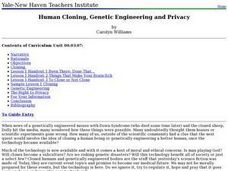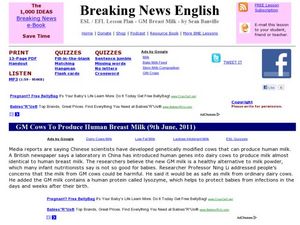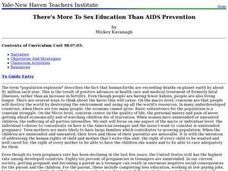Curated OER
Ages in Stages: An Exploration of the Life Cycle based on Erik Erikson's Eight Stages of Human Development
Examine Erikson's chart on the various stages one goes through growing up. Individually, they write a paper on whether or not they fit into those categories and how they are different today. In groups, for each stage they role play the...
Curated OER
Human Embryology
Ninth graders are introduced to the concept of human embryology. Individually, they complete an exercise in which they determine which trait they got from which family member. In groups, they identify and label the reproductive organs...
Curated OER
Taking Care of a Baby
Caring for a newborn is harder than it looks! Elementary pupils learn more about taking care of babies with an age-appropriate lesson that addresses how babies grow inside their mothers, what they need to grow, and how members...
Curated OER
Human Cloning, Genetic Engineering and Privacy
Review the aspects of human cloning and the moral issues associated with it. Individually, your students will keep a list of the articles related to this issue and research issues related to the ethic issues people are concerned with....
Curated OER
Rock-a-bye Babies in a Wetland
Students review the way human babies grow and what type of care they need. Using the internet, they are introduced to five different wetland habitat animals and how their babies grow. They discover how they are born and what the...
Curated OER
The Human Brain's Capacity for Language
Incorporate this slide show into your lecture about speech, language, psychology, or physiology. Addressing the structure of the brain as well as handedness and aphasia, the presentation could fit the needs of many different lecturers....
Curated OER
Breaking News: GM Cows to Produce Human Breast Milk
Students explore current events by reading and analyzing an article in class. In this human diet lesson, students read an article about cows which are being genetically modified in order to produce human breast milk for consumption....
Curated OER
I Watch Babies Grow
Students examine the potential of human beings. In this philanthropy lesson, students research the life of peer as they interview them and create a timeline that features important moments in their lives.
Curated OER
What Are We Going To Do About Baby Six Billion?
Students formulate and evaluate suggestions about government policy using demographic examples and projections. They examine websites and utilize worksheets imbedded in this plan.
Curated OER
Geological Development of Indiana and the Movement of Peoples Across the State
Fourth graders examine the geological development of the state of Indiana. Using the internet, they interact with the United States Geological Survey. They identify earthquake zones and energy resources in the state. They work...
Curated OER
Connections Between World Events, Geography and the Human Quest for Knowledge
Students examine the relationship between innovations in geography and world events. Using maps, they report different information from a spatial perspective. They develop hypothesis about how man's quest for knowledge has impacted the...
Curated OER
Health: Symptoms and Stages of Pregnancy
Students examine the growth and changes that occur during the three trimesters of pregnancy. Issues such as toxemia and spontaneous abortion are also considered. In groups, students rotate to various stations exploring aspects related...
Curated OER
The Population Explosion: Causes and Consequences
Students use this lesson to focus on population growth and the threat of overpopulation. In groups, they analyze the world birth and death rates to determine the growth rate of the population. As a class, they discuss the causes and...
Curated OER
Born Equal
Young scholars work in small groups to list advantages and disadvantages of being a woman. The focus of the lesson is upon discrimination. Working in a group provides scaffolding to help learners who are disadvantaged for any reason.
Curated OER
Social Studies: Classroom Culture
Sixth graders compose a list of classroom cultural values. They begin with a list of unacceptable behaviors. Each student presents two ideas they think should be part of the class culture. Students try to persuade classmates to accept...
Curated OER
There's More To Sex Education Than AIDS Prevention
Young scholars are introduced to the views on sexuality in the United States. In groups, they research data from five countries and compare them with the United States. Using the information, they develop reasons why the teenage...
Curated OER
Case in Point
Students read about and discuss the re-opening of the Emmett Till murder case. They research and write about a famous civil rights trial and create a poster highlighting the importance of the trial.
Curated OER
Mother-Infant Observation
Students observe a mother and infant playing for ten minutes. In this mother-infant observation lesson, students evaluate the infant's activity according to physical characteristics, locomotion, communication, and patterns of...
Curated OER
Let's Have a Lesson Within a Lesson
Students role-play the role of a student who does not comprehend the language the lesson is being instructed in. Using the internet, they research the characteristics, distribution and migration of human populations over time. In groups,...
National First Ladies' Library
Leeches and Spiders and Toads, Oh, My! The Emergence of Modern Medicine
Young scholars explore the basic ideas and beliefs about medicine in the 18th and 19th centuries. They write a news account to be published in a "medical journal" developed by the class. Each "article" in the journal should be dated...
Curated OER
JUST A MATTER OF TIME
Students recognize the dynamic changes in themselves and in agriculture that have occurred through the years. They are shown pictures of a baby or students are asked to think of their little brothers or sisters or themselves in...
Curated OER
Sadako and the 1000 Paper Cranes
Students read the novel "Sadako and the 1000 Paper Cranes by Eleanor Coerr. They Reaearch Japanese Culture and design a presentation based on information from the Sadako Peace Club link.
Curated OER
Key Ingredients: America by Food
Young scholars participate in a series of activities to explore the types of food Americans eat, how food choices differ in various parts of the country, and how the availability of various foods has changed over time.
Curated OER
Key Ingredients: America By Food
In this set of five lessons, learners analyze the important of food traditions, identity, and history. Students analyze how food traditions contribute to family identity, investigate family food traditions through interviews, and compare...























